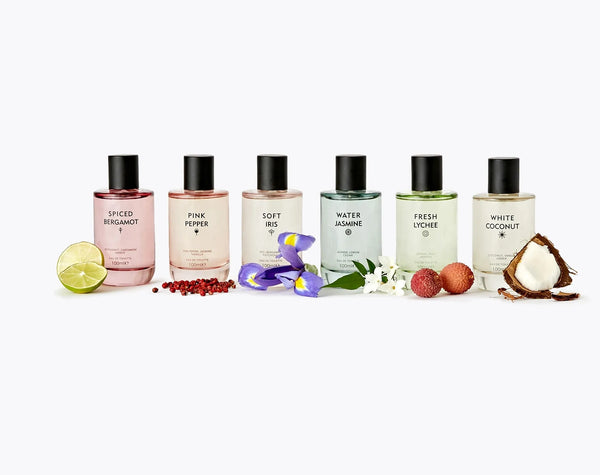What Does Lemon Grass Smell Like?

What Does Lemon Grass Smell Like?
Lemon grass is a popular ingredient in fragrances due to its refreshing and invigorating aroma. This article aims to explore the aroma profile of lemon grass, its role in fragrances, the science behind its scent, the impact of lemon grass on mood and emotions, and how to choose a fragrance with lemon grass notes. Let's delve into the fascinating world of lemon grass fragrance.
Understanding the Aroma Profile of Lemon Grass

Lemon grass, also known as Cymbopogon citratus, is a perennial grass native to tropical regions. Its distinct scent is citrusy, herbaceous, and slightly sweet. The aroma of lemon grass can be described as lively, vibrant, and uplifting, making it a popular choice in perfumery and aromatherapy products.
Let's dive deeper into the fascinating world of lemon grass scent and explore its intricate details.
The Basic Notes of Lemon Grass Scent
At its core, lemon grass scent can be categorized into three main notes:
- Citrus: Lemon grass shares its citrusy undertones with lemon and lime, adding a zesty and refreshing element to fragrances. The bright and tangy aroma of citrus fruits brings a burst of energy and invigorates the senses.
- Herbaceous: The herbaceous notes of lemon grass are reminiscent of fresh-cut grass, adding a natural, green character to fragrances. This earthy aspect evokes images of lush meadows and brings a touch of nature's tranquility.
- Sweetness: Lemon grass carries a subtle sweetness, similar to that of lemon candy, which adds depth and complexity to its scent. The delicate sweetness balances the citrus and herbaceous notes, creating a harmonious blend that is both refreshing and comforting.
These three notes work together in harmony, creating a symphony of aromas that captivate the olfactory senses.

The Complexity of Lemon Grass Aroma
While lemon grass has these basic scent characteristics, its aroma is far from one-dimensional. The complexity of lemon grass lies in its layered fragrance profile, combining fresh and bright citrus tones with earthy and herbal nuances.
Imagine strolling through a sun-kissed citrus orchard, where the air is filled with the invigorating scent of lemon and lime. As you walk further, you come across a serene meadow, where the grass is freshly cut, releasing a calming and grounding aroma. Lemon grass captures the essence of this experience, blending the vibrant citrus notes with the soothing herbaceous undertones.
This multidimensional aspect makes lemon grass an intriguing ingredient for perfumers seeking to create captivating fragrances. It offers endless possibilities for creating unique scent compositions that evoke a sense of freshness, vitality, and natural beauty.
Whether used in perfumes, candles, or essential oils, lemon grass brings a touch of nature's vibrancy and serenity to any product it graces. Its aroma uplifts the spirit, awakens the senses, and transports you to a tropical paradise.
The Role of Lemon Grass in Fragrances
Lemon grass finds its place in various fragrance formulations, ranging from perfumery to aromatherapy products. Let's explore how this versatile ingredient contributes to the world of scents.
When it comes to perfumery, lemon grass is not just an ordinary ingredient; it is a key player that adds a unique touch to fragrances. Known for its fresh and invigorating scent, lemon grass is often used as a top note in perfumes. Its uplifting and citrusy aroma provides an initial burst of freshness, creating a sparkling and vibrant opening.
But what makes lemon grass truly special is its ability to blend harmoniously with other fragrance notes. It effortlessly complements other citrus notes like bergamot and grapefruit, adding a zesty and energetic twist to the overall composition. Additionally, lemon grass blends beautifully with floral, green, and woody accords, enhancing the complexity and depth of the fragrance.
However, lemon grass's contribution to the world of scents doesn't stop at perfumery. This remarkable ingredient also plays a significant role in aromatherapy products, offering a range of benefits for the mind, body, and soul.
In the realm of aromatherapy, lemon grass is highly regarded for its reputed calming and stress-relieving properties. Its scent is believed to have a soothing effect on the mind, promoting relaxation and reducing anxiety. Whether in the form of essential oils, candles, or diffusers, lemon grass-infused products create a serene and tranquil ambiance, perfect for unwinding after a long day.
Furthermore, lemon grass is known to enhance mental clarity and uplift the mood. Its refreshing aroma can help clear the mind, sharpen focus, and boost productivity. Whether you're studying, working, or simply in need of a mental pick-me-up, lemon grass can provide the aromatic support you need.
It's fascinating to see how lemon grass, a humble herb, has made its way into the world of fragrances. From perfumery to aromatherapy, this versatile ingredient continues to captivate our senses and enrich our olfactory experiences. So the next time you come across a fragrance or aromatherapy product that features lemon grass, take a moment to appreciate the depth and complexity it brings to the composition.
The Science Behind Lemon Grass Scent

Behind the captivating aroma of lemon grass lie fascinating scientific explanations. Let's unveil the chemistry and sensory perception associated with its scent.
Lemon grass, scientifically known as Cymbopogon citratus, is a tropical grass native to Southeast Asia. It is widely used in culinary, medicinal, and cosmetic applications due to its refreshing scent and various beneficial properties.
The Chemical Compounds of Lemon Grass
Lemon grass fragrance is attributed to its chemical composition. The essential oil derived from lemon grass mainly contains compounds such as citral, geraniol, limonene, and myrcene. These volatile organic compounds contribute to its citrusy, herbal, and sweet aroma.
Citral, also known as geranial and neral, is the primary component responsible for the lemon-like scent of lemon grass. It gives the fragrance its zesty and bright character. Geraniol adds a floral and rosy note, while limonene provides a hint of citrus freshness. Myrcene contributes to the herbal and earthy undertones, enhancing the overall complexity of the scent.
How Our Nose Perceives Lemon Grass
When we inhale the scent of lemon grass, our olfactory receptors detect the volatile compounds present in the fragrance. These receptors, located in the nasal cavity, are specialized cells that bind to specific odor molecules.
Upon binding, the olfactory receptors send signals to the olfactory bulb, which is part of the brain's limbic system. The limbic system is associated with emotions, memory, and behavior. This connection explains why certain scents, like lemon grass, can evoke vivid memories or alter our mood.
The combination of chemical compounds interacts with our olfactory system, creating the unique and recognizable scent of lemon grass. The brain processes these signals and interprets them as a pleasant and refreshing aroma.
Interestingly, lemon grass scent is not only perceived through the nose but can also be detected by the taste buds. When used in culinary preparations, the volatile compounds in lemon grass can stimulate the taste receptors, enhancing the overall flavor profile of a dish.
In addition to its olfactory and gustatory effects, lemon grass has been found to possess various therapeutic properties. It is known for its antimicrobial, anti-inflammatory, and antioxidant properties, making it a valuable ingredient in traditional medicine and natural remedies.
Next time you encounter the invigorating scent of lemon grass, take a moment to appreciate the intricate chemistry and sensory experience behind it. From its chemical compounds to the way our nose perceives it, lemon grass is truly a fascinating botanical wonder.
The Impact of Lemon Grass Scent on Mood and Emotions
Beyond its pleasant aroma, lemon grass has the potential to influence our mood and emotions. Let's explore the psychological effects of its aroma and its connection to memory.
The Psychological Effects of Lemon Grass Aroma
The scent of lemon grass is known for its uplifting and energizing properties. It is often used as a mood booster and stress reliever. The aroma can create a sense of freshness, increase alertness, and promote a positive mindset. Lemon grass can be particularly invigorating in the morning or during times when you need a pick-me-up.
Lemon Grass Scent and Memory
Scents have a powerful connection to memory, and lemon grass is no exception. The aroma of lemon grass has the potential to evoke memories or associations related to its fragrance. Whether it reminds you of a tropical getaway, a comforting drink, or a specific moment, the scent of lemon grass can transport you to different places and times.
How to Choose a Fragrance with Lemon Grass Notes
If you're intrigued by the scent of lemon grass and would like to explore fragrances with its unique notes, here are some tips:
Identifying Lemon Grass in Fragrance Notes
When browsing for fragrances, look for keywords in the fragrance notes that indicate the presence of lemon grass. Terms such as lemon grass, lemongrass, Cymbopogon, or citral are indicators that the fragrance contains the desired aroma.
Pairing Lemon Grass with Other Scents
Lemon grass pairs well with a variety of other fragrance notes. For a refreshing and invigorating combination, seek fragrances that blend lemon grass with citrus notes like bergamot, lime, or grapefruit. For a more complex and herbal experience, look for fragrances that combine lemon grass with lavender, basil, or patchouli.
In conclusion, the aroma of lemon grass in fragrance is a delightful and versatile addition. Its citrusy, herbaceous, and sweet scent creates a refreshing and invigorating experience. Whether in perfumes or aromatherapy products, lemon grass has the power to enhance moods, evoke memories, and provide a sense of vitality. If you're drawn to its captivating aroma, exploring fragrances with lemon grass notes will take you on a sensory journey like no other.




